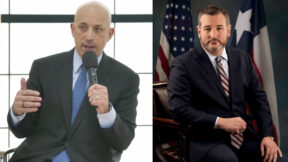James Comey Files Motion to Dismiss Trump DOJ Charges

(AP Photo/J. Scott Applewhite)
Former FBI Director James Comey and his legal team filed a motion to dismiss the federal case against him, arguing in a court filing on Monday his indictment was the result of President Donald Trump’s “personal spite.”
Trump’s hatred for Comey, the filing said, was due to the ex-FBI boss “vigorously and prominently” criticizing him in the media.
“The government has singled out Mr. Comey for prosecution because of his protected speech and because of President Trump’s personal animus toward Mr. Comey. Such a vindictive and selective prosecution violates the First Amendment, Due Process Clause, and the equal protection principles,” the Monday filing said.
It continued: “The proper remedy for this unconstitutional prosecution is dismissal with prejudice. Any lesser remedy would be insufficient in light of the government’s flagrant misconduct and the need to deter the government from bringing further unconstitutional prosecutions.”
The filing comes less than a week after Comey’s legal team said it would be filing the motion and “challenging the lawfulness” of recently-appointed U.S. Attorney Lindsey Halligan, the former personal attorney for President Trump who secured the indictment against the president’s rival.
Comey filed the motion in U.S. District Court for the Eastern District of Virginia.
The filing comes two weeks after Comey pleaded not guilty to the two counts against him — making a false statement to Congress and obstruction of a congressional proceeding.
The federal case against Comey is focused on if he lied to Congress in Sept. 2020 about his handling of the investigation into whether President Trump or members of his campaign colluded with Russia during the 2016 presidential election.
That investigation was dubbed “Crossfire Hurricane” by the FBI and started in mid-2016. The indictment against Comey alleged he falsely stated he did not authorize an FBI agent to be an anonymous source to news outlets.
Comey’s filing on Monday said his indictment “presents an inaccurate description” of his comments to Sen. Ted Cruz (R-TX) in 2020, and thus led to the fraudulent charges against him.
President Trump fired Comey in May 2017. Soon after, Robert Mueller was appointed special counsel and took over the investigation. Mueller, in 2019, completed his probe and found no evidence of criminal conspiracy or coordination between Trump and Russia.
Trump, earlier this year, called the investigation a “disgrace” and a “total weaponization” of the FBI.
The ex-FBI boss was indicted on Sept. 25 — less than a week after the president urged Attorney General Pam Bondi to take “action” against Comey and other political enemies, including Sen. Adam Schiff (D-CA) and New York AG Letitia James.
Comey, in his motion on Monday, pointed to Trump’s Truth Social post calling on Bondi to prosecute him. It also called Halligan the president’s “hand-picked” prosecutor, who was selected only to go after the president’s enemies.
“On her fourth day in office, September 25, 2025, Ms. Halligan sought a grand jury indictment of Mr. Comey—just days before the five-year statute of limitations on Mr. Comey’s purported offense was set to expire,” the motion said.
Comey’s motion added:
“Objective evidence establishes that President Trump directed the prosecution of Mr. Comey in retaliation for Mr. Comey’s public criticisms and to punish Mr. Comey because of personal spite.”
If Comey’s motion to dismiss the case is not granted, his trial is set to start in January 2026.





Comments
↓ Scroll down for comments ↓